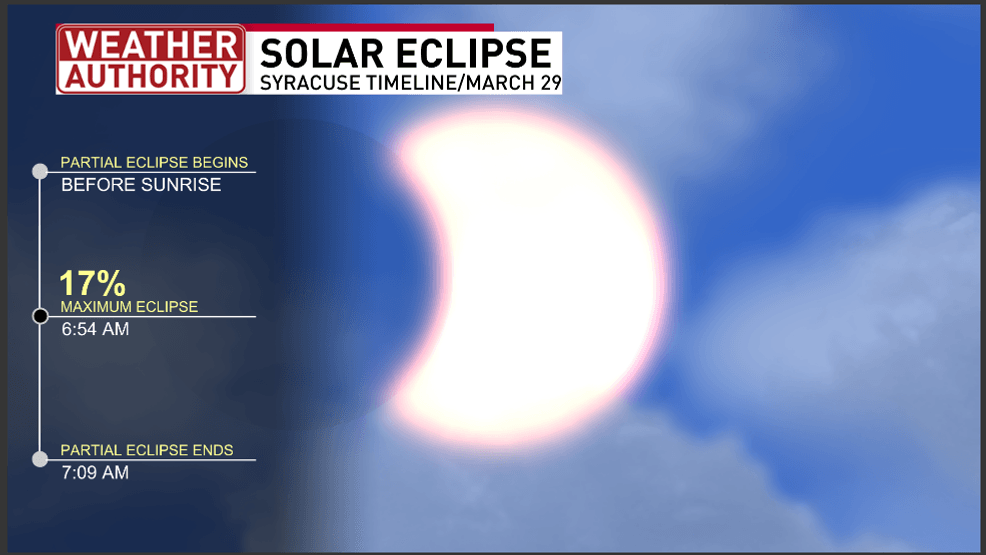Northeast US Solar Eclipse: Witnessing Saturday's Dawn Spectacle
Editor's Note: A partial solar eclipse will grace the northeastern United States on Saturday morning. This article provides a comprehensive guide for safe viewing and understanding this celestial event.
Why This Matters: A Rare Dawn Phenomenon
A partial solar eclipse is a relatively rare event, offering a unique opportunity for astronomical observation and scientific understanding. This Saturday's eclipse will be particularly noteworthy for those in the Northeast US, as it will occur during dawn, creating a visually stunning spectacle. Understanding solar eclipses helps us appreciate the mechanics of our solar system and the predictable movements of celestial bodies. This event is important because it sparks scientific curiosity, promotes STEM education, and offers a memorable experience for the public. We'll explore the key aspects of this eclipse, providing tips for safe viewing and answering frequently asked questions.
Key Takeaways:
| Aspect | Description |
|---|---|
| Eclipse Type | Partial Solar Eclipse |
| Date & Time | Saturday Dawn (Specific times vary by location – see below) |
| Visibility | Northeast United States (best viewing in northern Maine and New Hampshire) |
| Safety Precautions | Always use certified solar viewers or indirect viewing methods. |
| Scientific Importance | Provides opportunities for scientific observation and public engagement with astronomy |
Northeast US Solar Eclipse: A Dawn Spectacle
This Saturday's partial solar eclipse will be a truly captivating event, especially for those in the Northeast. The unique timing during dawn promises a breathtaking combination of sunrise hues and the partially obscured sun. The eclipse's partial nature means that the sun will only be partially covered by the moon's shadow, unlike a total solar eclipse where the sun is completely blocked.
Key Aspects of the Eclipse:
- Partial Coverage: The degree of coverage will vary depending on the location, with northern Maine and New Hampshire experiencing the most significant obscuration.
- Timing: The precise timing of the eclipse will depend on the specific location within the Northeast US. Consult local astronomy resources or online eclipse calculators for accurate times in your area.
- Visibility: Clear skies are essential for optimal viewing. Check weather forecasts before heading out to observe the eclipse.
Detailed Analysis: Regional Variations and Peak Times
The eclipse's path and timing will differ slightly across the Northeast. For example, areas closer to the Canadian border will experience a higher percentage of the sun's surface being obscured than locations further south. Online resources and apps dedicated to astronomical events are crucial for determining precise timing and percentage of coverage for your specific location. Remember to check these resources before the event for the most accurate information.
Safe Viewing Practices: Protecting Your Eyes
Safe Eclipse Viewing: Prioritize Eye Safety
Never look directly at the sun during a solar eclipse without proper eye protection. Doing so can cause serious and permanent eye damage, including blindness. Certified solar viewers, which are readily available online and at many astronomy stores, are essential for safe viewing.
Alternative Methods:
- Pinhole Projection: Create a pinhole projector using cardboard and foil to project an image of the sun onto a surface.
- Indirect Viewing: Observe the eclipse's reflection in a body of water or on a shaded surface.
Summary: Prioritize Safety Above All
Remember: Safe viewing practices are paramount. Never compromise your eye health for a view of the eclipse.
People Also Ask (NLP-Friendly Answers)
Q1: What is a partial solar eclipse?
A: A partial solar eclipse occurs when the moon passes between the sun and Earth, but doesn't completely cover the sun's disk.
Q2: Why is this eclipse important?
A: It's a significant event for astronomy enthusiasts and a chance for scientific observation and public engagement with space.
Q3: How can I benefit from observing this eclipse?
A: Witnessing a celestial event like this can be a memorable and awe-inspiring experience, fostering a sense of wonder about the universe.
Q4: What are the main challenges with viewing this eclipse?
A: The main challenge is ensuring safe viewing practices to avoid eye damage. Weather conditions could also affect visibility.
Q5: How to get started with observing the eclipse safely?
A: Purchase certified solar viewers or use a pinhole projector method and check the weather forecast.
Practical Tips for Observing the Northeast US Solar Eclipse
Introduction: These tips will help you prepare for and safely enjoy Saturday's partial solar eclipse.
Tips:
- Check the timing: Determine the precise eclipse times for your location using online resources.
- Find a safe viewing spot: Select a location with a clear view of the eastern horizon.
- Use certified solar viewers: Never look directly at the sun without proper protection.
- Prepare your equipment: Have your solar viewers or pinhole projector ready in advance.
- Check the weather forecast: Clear skies are essential for optimal viewing.
- Share the experience: Invite friends and family to join you for this unique event.
- Learn more: Research solar eclipses and the science behind them to enhance your appreciation.
- Take photos: Use a solar filter on your camera to capture images of the eclipse (but prioritize safe viewing!).
Summary: Preparation and safety are key to enjoying this event.
Transition: Let's conclude by summarizing the key takeaways of this article.
Summary
Saturday's partial solar eclipse presents a unique opportunity to witness a breathtaking celestial event in the Northeast US. Remember to prioritize eye safety by using certified solar viewers or indirect viewing methods. This event is a valuable opportunity for science education and public engagement with astronomy.
Closing Message
The dawn solar eclipse serves as a reminder of the wonders of the universe and the importance of scientific curiosity. Did this eclipse inspire you to learn more about astronomy? Share your experience and these insights with others!
Call to Action (CTA)
Share this article with your friends and family! Let's all safely witness and appreciate this incredible celestial event. Sign up for our newsletter for updates on future astronomical events! [Link to Newsletter Signup]

